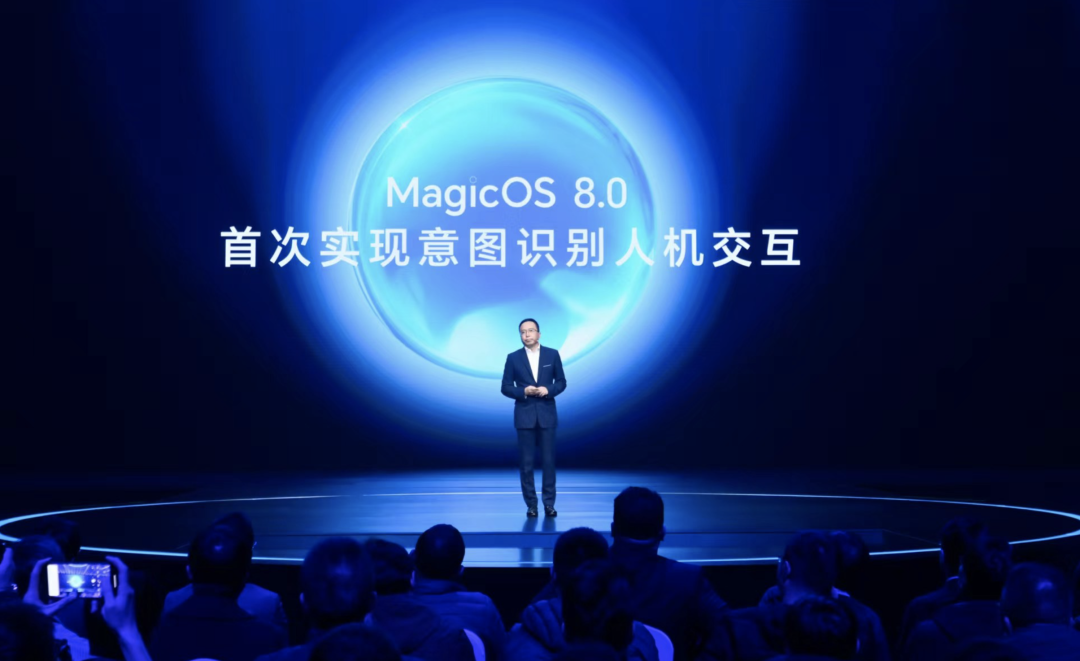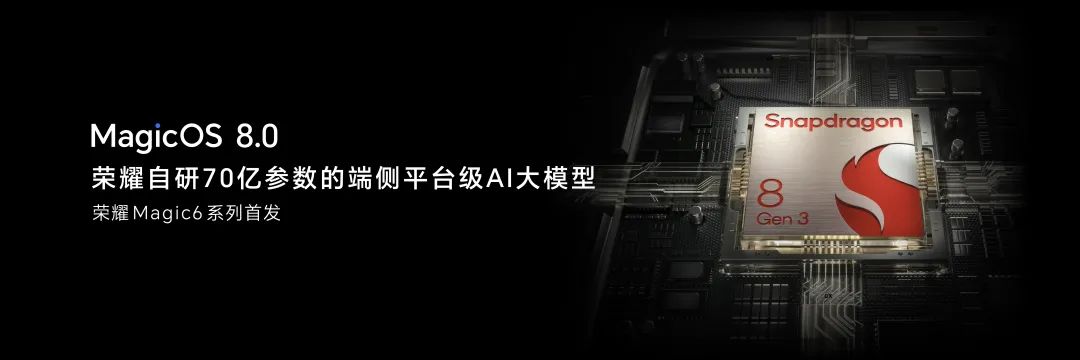Source: Synced

Image Source: Generated by Wujie AI
Redoing the operating system with AI.
In the field of mobile OS, which is full of "micro-innovations," someone has finally brought something different.
This afternoon, Honor unveiled the new generation system MagicOS 8.0 (Chinese name: 魔法 OS 8.0), which, through comprehensive AI integration, shows us what the future human-computer interaction should look like.
Honor phones equipped with MagicOS 8.0 demonstrate a series of new capabilities empowered by AI:
If you want to edit a video, just say a few words to the intelligent assistant, and the phone can automatically select the characters and scene materials you mentioned from the local gallery, edit them, add music, and generate a clip;

For event times and locations in text notifications, there's no need to laboriously copy specific text. Just drag the conversation bubble to the edge of the screen, and the system will automatically determine the user's travel needs, triggering the "Anydoor" function, directly jumping to the taxi or map app. Just drag the text to the app for one-step taxi or navigation;

No need to pair or download phone assistant software. Different devices can automatically connect in a loop, and information, apps, and files can seamlessly circulate among different devices. Swiping right on the phone's address information can directly navigate on the car's display;

This series of new experiences makes people can't help but marvel: Has the interactive way of the future really arrived?
One-step Direct: Platform-level AI Realizes Intent Recognition
Recently, domestic mobile phone manufacturers have been busy adding large models to new systems.
With the empowerment of large models, various OSs have undergone significant changes. The most intuitive is the various generative AI capabilities, whether it's intelligent search, text generation, or image generation. These new technologies have greatly enhanced the playability of mobile phones and even provided significant assistance in certain work and scenarios.
However, the role of large models is not just limited to search and generation. Honor MagicOS 8.0 has played differently. It fully integrates the capabilities of large models into the mobile system, empowering the system kernel comprehensively—platform-level AI, bringing the industry's first "intent-based" human-computer interaction, breaking the traditional way people search for services based on needs during conventional operations.

In the application of AI capabilities, Honor's biggest difference from the industry lies in this: other manufacturers treat AI as an application, while Honor platformizes AI capabilities and empowers all modules.
We know that the traditional OS kernel is responsible for managing and scheduling the hardware resources of the system, such as CPU, memory, hard disk, and I/O devices, to ensure the normal operation and efficient utilization of the entire system. Therefore, the system can only perform programmatic resource calls based on user input commands.
However, MagicOS 8.0 has built a new kernel of platform-level AI on top of the traditional kernel, which can learn human-related factors, including personal knowledge bases, such as individual and behavioral factors (such as age, gender, health status, exercise habits, lifestyle, work and leisure time, etc.); human location and status perception; human habits and profiles, and so on.
Through platform-level AI, the mobile system has gained better scene perception, intent decision-making, and user understanding capabilities. MagicOS can now support multi-modal, more natural and convenient input and output methods, intelligently recognize user intent, make efficient reasoning decisions, proactively provide personalized services, and thus improve interaction efficiency.
The most intuitive example of intent understanding is the "Anydoor." On Magic OS 8.0, we can achieve one-step searches for proper nouns, one-step movie viewing for titles, one-step printing for files, or multi-app price comparisons by taking screenshots:

Hold down a text message and drag the address directly to call a taxi/navigation, and so on:

All kinds of complex operations, all in just one step.
The Anydoor significantly improves the efficiency of human-computer interaction, reducing the previous 6-10 steps to just one step. Here, Magic OS has achieved a stronger perception and understanding of user intent. Based on these capabilities built on platform-level AI, they not only cover the latest flagship Magic6 series but will also be extended to many previously released phone models. The public beta upgrade plan will be gradually launched, expected to cover 42 models such as the Honor Magic5 series, Magic3 series, Honor 90 series, Honor X50 series, Honor X40 series, and Honor V8 Pro tablet.
Self-developed "Magic Large Model" on the Client Side
In order to drive the human-computer interaction capabilities of platform-level AI to achieve a leap from perception to cognition, a powerful large language model must be in place to further empower the "new kernel" and bring users a new experience that is personalized, humanized, and more privacy-protected.
Honor officially released the self-developed 7B client-side AI large model "Magic Large Model" on the Magic6. Through in-depth debugging in collaboration with Qualcomm, Honor's self-developed large model, after quantization compression, was deployed on the Magic6 series using the Snapdragon 8 Gen3, achieving smooth operation on the client side.

Through high-performance acceleration platforms, Honor optimized the large model through quantization and operator acceleration. The large model, which originally required 24GB of memory and desktop-level GPUs to run, was compressed by more than six times, achieving deployment and smooth operation on the client side. In addition, in terms of strategy scheduling, Honor significantly reduced background killing by predicting user intent and estimating people's operations in the next period.
Why is it necessary to build a truly client-side large model? Through the 7B large model, Honor tells us that doing so has the following advantages:
- Client-side large models can be trained based on the personal knowledge base stored on the phone, thereby truly understanding human-centered scenarios. Data is retained on the client side, achieving personalized AI capabilities while protecting personal privacy.
- The empowerment of large models enables platform-level AI to make a leap from perception to cognition. Client-side platform-level AI large models can more quickly and deeply, accurately, and delicately understand user intent, thereby providing more personalized complex scenario services.
- The 7B large model, as the central hub of the system, not only helps MagicOS understand user intent but can also efficiently call other large models, app services, and phone capabilities to solve problems.
Since the second half of last year, major manufacturers have successively released smartphone systems empowered by large models, and it seems that large models have entered the "second half." For the current application of large models, it is relatively easy to run tests, generate images, or create simple application demos. The real challenge lies in how to truly improve the daily user experience.
Solving complex, high-frequency problems encountered in people's daily lives in a simple way is the goal that MagicOS 8.0 hopes to achieve.
And this is not a simple matter.
Landing large model technology takes the "correct and difficult" path
Another key term for large models is "edge-cloud integration." Recently, large models with over a hundred billion parameters have emerged one after another. From smartphone manufacturers to tech companies, all are continuously strengthening their AI capabilities. However, the use of more powerful cloud-based large models faces the problem of lacking user understanding, as seen with ChatGPT.
Therefore, Honor has chosen to take the "correct and difficult" path: to build an efficient scheduling central architecture for client-side large models.
We know that in the field of large models, intelligent agents are the most advanced development direction. An intelligent agent is like a powerful assistant with knowledge, not only capable of deeply understanding your tasks but also linking the "thoughts" of large models together to autonomously achieve the various complex goals you set. And on MagicOS 8.0, such intelligent agents are being cultivated.
MagicOS 8.0 has innovatively introduced a new paradigm of edge-cloud collaboration. Using the YOYO intelligent assistant as the carrier, the system can fully coordinate the capabilities of client-side and cloud-based large models. In the future, client-side large models, as the central hub, will understand user intent, break down and arrange tasks, efficiently and securely connect to cloud-based large models, integrate and schedule atomic services, and complete complex task cycles. In this process, MagicOS can ensure that personal information does not go to the cloud, efficiently solve problems, and ensure privacy and security.
Based on the open architecture of the client-side large model central control, YOYO can help you ask appropriate questions to large models at the right time—users only need to provide natural voice, text, or images. This makes it possible for devices to understand people.
This improvement can completely change people's perception of using smartphones. For example, when using ChatGPT to book a flight, GPT will ask you where you want to go, what time you want to book the flight, what kind of airline you prefer, and then confirm each detail.
Platform-level AI hopes to bring large models more to the local level. Based on the AI of large models, AI will become an extension of your brain. By understanding personal information and preferences, AI on the client side learns your habits and preferences, and then assigns tasks to different applications through prompts, without the need for multiple interactions and without privacy leaks.
At the same time, the cloud-based large models connected by MagicOS will not be just one, but "hundreds." The "Hundred Model Ecology Plan" proposed by MagicOS plans to provide shelf services for a large number of third-party large models based on innovative central control architecture, jointly creating a smart service ecosystem based on intent interaction with internet companies.
As the industry's first open central control architecture for large models, Honor hopes to integrate cloud-based general large models and large models for various industry domains into MagicOS, providing better service distribution and task cycle experiences for each user.
For example, Honor is deeply cooperating with partners such as Baidu, Amap, and Air Travel Horizon:
The YOYO assistant can seamlessly communicate with Amap, planning the optimal route personalized for you with just one sentence, "First to my wife's company, then back home, then to the usual place to meet friends," and can automatically launch Amap to generate multi-segment trip navigation.
The intelligent assistant can also directly utilize the capabilities of Baidu Wenxin's large model to provide personalized text creation, knowledge Q&A, and life advice for you. During the flight booking process, Honor's client-side large model can combine your future schedule and habits, break down and desensitize the demand while hiding personal information, and access the Air Travel Horizon Qianrang large model to directly obtain the corresponding booking information.
These experiences will be implemented in the first half of the year, and with the further advancement of Honor's open large model ecosystem, new capabilities will continue to emerge.
Currently, the large model field is undergoing a "battle of a hundred models." In the application end, only through the open service ecosystem of large models can the development of the ecosystem be promoted. Perhaps by allowing smartphone manufacturers, app vendors, and others to focus on their respective strengths, large model technology can land more quickly, connect to more services, and bring changes to people's lives.
"Magic OS": The Third Pole of Smartphone Systems
Many of the ideas and functions brought about by large models at the current stage are just the beginning of the revolution. With the continuous growth of client-side computing power and the advancement of algorithm technology, AI will comprehensively reconstruct the OS, and we will witness more and more revolutionary capabilities. The operations seen in science fiction movies may not be far away.
In this regard, the importance of Honor is gradually becoming apparent. AI has always been the direction that Honor has been exploring. In the field of artificial intelligence, Honor has invested billions in research and development.
As early as 2016, Honor released the Magic Live intelligent system, beginning to promote intelligent software and hardware interaction.
By 2022, with MagicOS 7.0, Honor has achieved platform-level AI based on the MagicRing trust environment, Magic Live intelligent engine, Turbo X system engine, and MagicGuard, building an AI-enabled intelligent full-scenario operating system.
Today's MagicOS 8.0, with its stronger intent recognition capabilities, has brought about a new revolution in human-computer interaction. The introduction of the self-developed client-side Magic Large Model further strengthens the phone's system kernel, and platform-level AI has completed its evolution. Honor has now entered the 3.0 stage of AI development.
Thus, we cannot help but marvel at the speed of Honor: since last year, Honor's performance in technology has far exceeded our understanding of a "new player in the domestic smartphone industry." From the industry's first self-developed RF enhancement chip C1 to breaking the record for the thinnest foldable screen, from eye protection capabilities to large models, as a brand that has been independent for just over three years, Honor quickly established itself as a unique force in many fields through products and innovations that embody Honor's technological idealism.
The evolution of the platform-level AI capabilities of MagicOS is also the same. From iOS and Android to HarmonyOS, the development of operating systems has been dedicated to solving the adaptation and compatibility issues of underlying hardware ecosystems and internet ecosystems, and has continuously developed and improved various experiences based on this core. However, Honor did not iterate and upgrade along the existing framework of the operating system but instead reconstructed the system with AI as the core, bringing about a new human-computer interaction based on intent recognition and building a new ecosystem for "Magic OS." In the future, as the journey towards overseas opens further, "Magic OS" may fully consolidate global AI capabilities, and Honor's goal of becoming a global force will become closer and closer.
The times require boundless imagination and creativity, whether it's AI Pin, Aloha, or Honor's MagicOS, they are all trying to provide different answers to the industry. We look forward to these pioneering companies opening up an imaginative future for each of us.
免责声明:本文章仅代表作者个人观点,不代表本平台的立场和观点。本文章仅供信息分享,不构成对任何人的任何投资建议。用户与作者之间的任何争议,与本平台无关。如网页中刊载的文章或图片涉及侵权,请提供相关的权利证明和身份证明发送邮件到support@aicoin.com,本平台相关工作人员将会进行核查。




